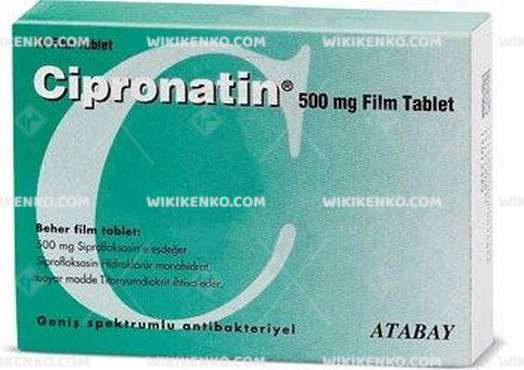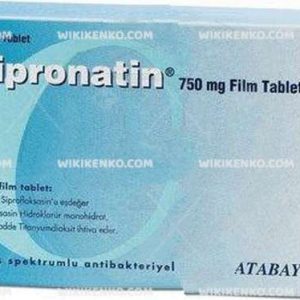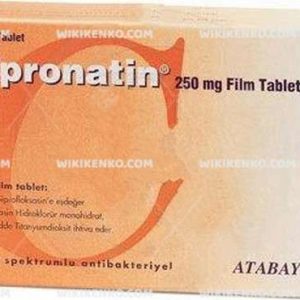Cipronatin Film Tablet 500 Mg
Cipronatin, a potent antibiotic containing ciprofloxacin hydrochloride. In this comprehensive article, we explore the usage, mechanism of action, distribution, and potential side effects. Stay informed about the remarkable efficacy of this medication in treating various bacterial infections.
| Dosage form | |
|---|---|
| Pack size | |
| Potency | 500 Mg |
| Manufacturer | |
| Origin | |
| Generic Name (Ingredient) | A Film-Coated Tablet Contains 583 Mg Of Ciprofloxacin Hydrochloride, Equivalent To 500 Mg Of Ciprofloxacin. |
Assuming your emergency circumstances for this product, visit Urgent Quotation page. Besides, for any pharmaceutical questions, please ask us in the comments section.
Description
Cipronatin is a film tablet that contains 500 mg of ciprofloxacin, equivalent to 583 mg of ciprofloxacin hydrochloride. This synthetic 4-quinolone derivative exhibits remarkable bactericidal activity against a broad spectrum of gram-positive and gram-negative organisms. With its potent antibacterial action, it is a reliable choice for combating infections caused by sensitive bacteria.
Usage
Cipronatin is highly effective in treating various infections caused by susceptible bacteria. This versatile antibiotic can be used to address the following conditions:
Severe Systemic Infections: Cipronatin is invaluable in treating severe systemic infections, such as septicemia, bacteremia, peritonitis, and infections in immunosuppressed patients with hematological or solid tumors. It is particularly beneficial for patients in intensive care units with specific problems, including infected burns.
Respiratory Tract Infections: Cipronatin plays a crucial role in combating respiratory tract infections, including lobar and bronchopneumonia, acute and chronic bronchitis, and empyema. Its effectiveness in addressing these conditions contributes to better respiratory health.
Urinary Tract Infections: Uncomplicated and complicated urethritis, cystitis, pyelonephritis, prostatitis, and epididymitis can be effectively treated with Cipronatin. This antibiotic helps alleviate the discomfort and complications associated with urinary tract infections.
Skin and Soft Tissue Infections: From infected ulcers and wound infections to abscesses, cellulitis, otitis externa, erysipelas, and infected burns, Cipronatin proves its efficacy in combating a wide range of skin and soft tissue infections.
Mechanism of Action
The bactericidal activity of Cipronatin stems from its interference with the enzyme DNA gyrase, which is essential for bacterial DNA synthesis. By targeting this vital enzyme, it effectively inhibits the growth and reproduction of susceptible bacteria. Notably, the mode of action of Cipronatin sets it apart from other antibiotics, such as penicillins, cephalosporins, aminoglycosides, and tetracyclines. This uniqueness enables it to combat organisms resistant to these antibiotics effectively.
Distribution and Excretion
Cipronatin is well absorbed from the gastrointestinal tract upon oral administration, ensuring efficient delivery of the medication into the body’s tissues and fluids. With a half-life of 3.5 – 4.5 hours, it exhibits a favorable duration of action. Approximately 30-50% of an oral dose of Cipronatin is excreted in the urine within 24 hours, including both unchanged drug and active metabolites. This efficient elimination process aids in optimizing treatment outcomes.
Potential Side Effects
While Cipronatin is generally well-tolerated, it is essential to be aware of potential side effects that may occur in some individuals. Common side effects include:
Gastrointestinal Disturbances: Nausea, diarrhea, vomiting, dyspepsia, and abdominal pain are some gastrointestinal symptoms that may occur. These side effects are generally mild and transient.
Central Nervous System Disturbances: Dizziness, headache, tiredness, confusion, and convulsions are central nervous system-related side effects that may occur in rare cases. If you experience any of these symptoms, it is important to consult your doctor.
Hypersensitivity Reactions: Skin rashes and pruritus may occur as hypersensitivity reactions to Cipronatin. If you develop any allergic symptoms, it is crucial to seek medical advice promptly.
Conclusion
Cipronatin, enriched with ciprofloxacin hydrochloride, stands as a powerful antibiotic for the treatment of bacterial infections. Its broad-spectrum activity, mechanism of action, optimal distribution, and manageable side effects make it an excellent choice for healthcare professionals.
If you require treatment for severe systemic infections, respiratory tract infections, urinary tract infections, or skin and soft tissue infections, consult your doctor to determine if it is the right option for you.
Use the form below to report an error
Please answer the questions as thoroughly and accurately as possible. Your answers will help us better understand what kind of mistakes happen, why and where they happen, and in the end the purpose is to build a better archive to guide researchers and professionals around the world.
The information on this page is not intended to be a substitute for professional medical advice, diagnosis, or treatment. always seek the advice for your physician or another qualified health provider with any questions you may have regarding a medical condition. Always remember to
- Ask your own doctor for medical advice.
- Names, brands, and dosage may differ between countries.
- When not feeling well, or experiencing side effects always contact your own doctor.
Cyberchondria
The truth is that when we’re sick, or worried about getting sick, the internet won’t help.
According to Wikipedia, cyberchondria is a mental disorder consisting in the desire to independently make a diagnosis based on the symptoms of diseases described on Internet sites.
Why you can't look for symptoms on the Internet
If diagnoses could be made simply from a textbook or an article on a website, we would all be doctors and treat ourselves. Nothing can replace the experience and knowledge of specially trained people. As in any field, in medicine there are unscrupulous specialists, differences of opinion, inaccurate diagnoses and incorrect test results.






Reviews
There are no reviews yet.